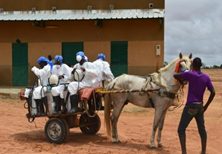
The PMI AIRS Project in Senegal scaled up IRS at a reduced cost with the help of community involvement in Malem Hoddar District. The community donated horses and carts to transport spray operators. Photo: PMI AIRS Senegal
PMI AIRS Project Pilots Community-Based IRS to Reduce Costs, Promote Acceptance
Indoor residual spraying (IRS) has proven highly effective in reducing the burden of malaria. However, the high cost of IRS presents a challenge to scaling up protection in many countries. In Senegal, the President’s Malaria Initiative Africa Indoor Residual Spraying (PMI AIRS) Project, with the National Malaria Control Program (NMCP), piloted a community-based IRS (CB-IRS) effort in Malem Hoddar District to reduce costs, such as vehicle rental, material storage, and personnel. CB-IRS also aims to reduce the duration of the IRS campaign while ensuring community ownership.
The PMI AIRS Project, with the National Malaria Control Program (NMCP), met with district officials, district medical officers, health post nurses, village chiefs, and other community leaders to promote the CB-IRS model. As a result, village leaders took on the responsibility to house and secure spray materials, which saved on having to rent a store and hire a storekeeper. The community members provided local transport (carts, vehicles and horses) and accommodation, reducing the cost of vehicle rentals and camping. The community leaders also committed to raise awareness in the community about the campaign.
Local recruitment for spray operators allowed the project to save on transportation and camping costs. Trainers emphasized the importance of the pilot and the involvement of the community to the 54 staff trained. During the six days of spraying, supervisors were in the field managing and encouraging the operators.
Of the 12,791 people protected, 263 were pregnant women and 2,637 were children under five. The pilot resulted in a 29% reduction in operation costs from the IRS campaign in 2015. The commitment of local authorities and communities contributed to a successful spray campaign. The community-level approach has the potential to be sustainable and affordable by the government.
This story was taken from www.africairs.net.
